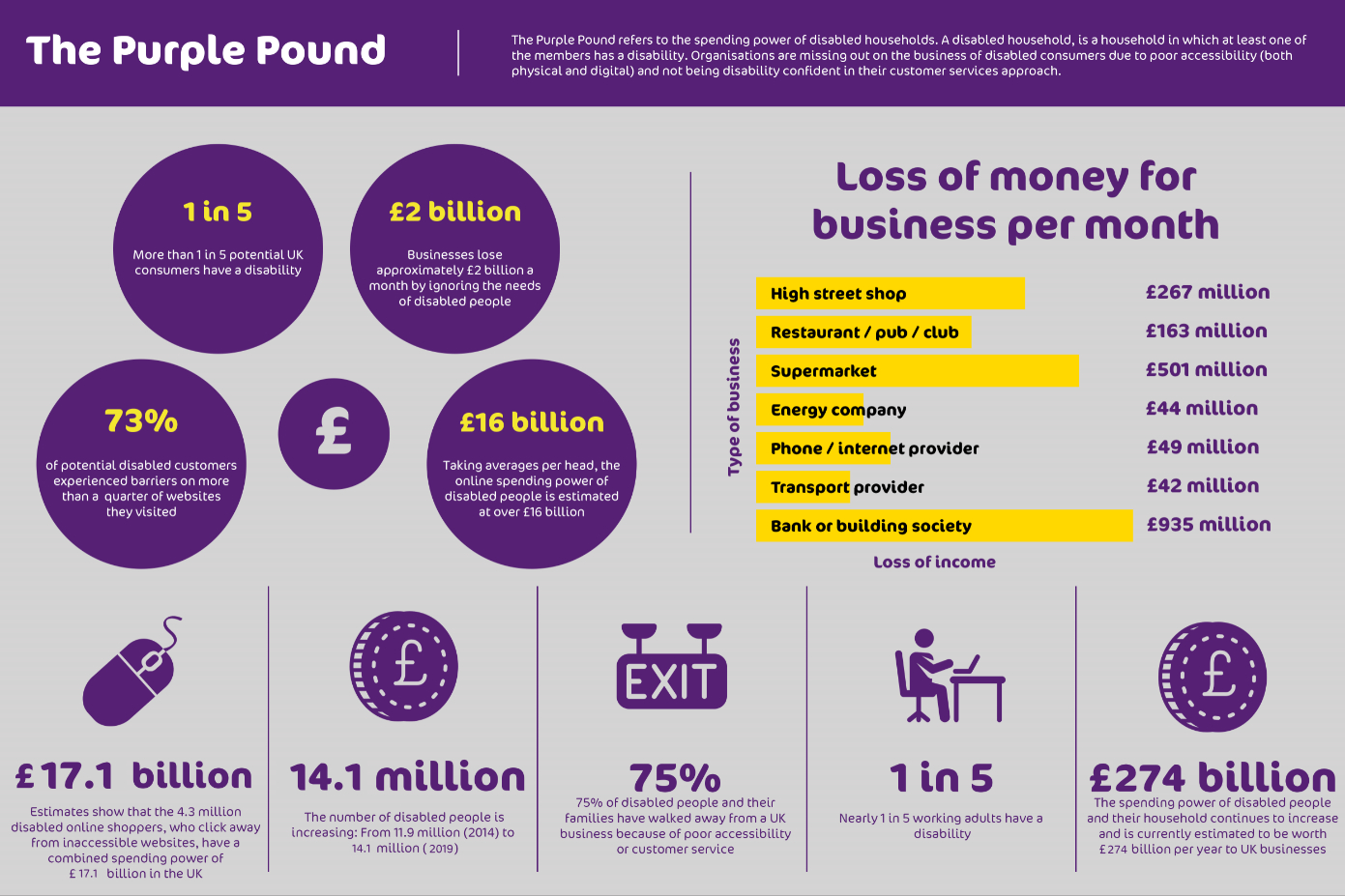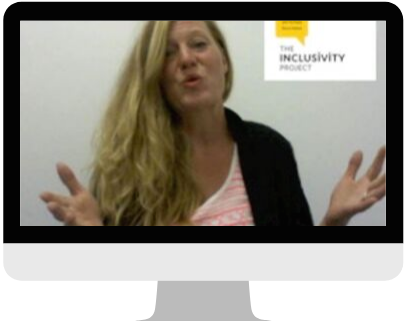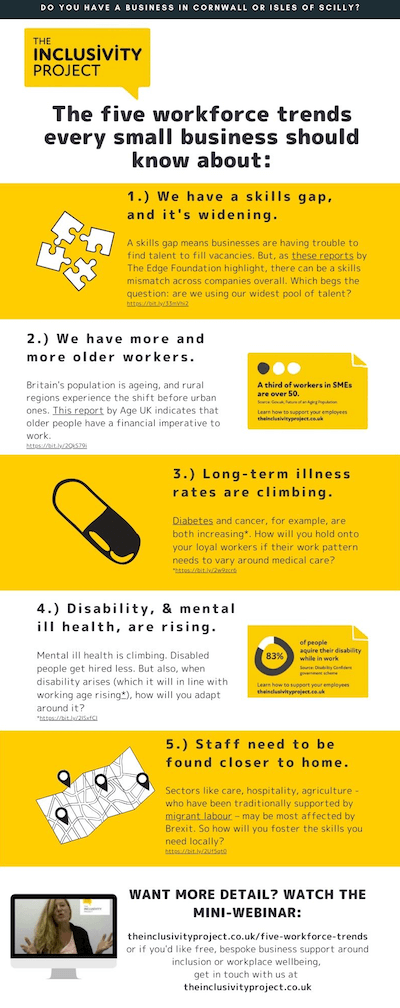The Inclusivity Project hears from Mark Shayler, leadership and sustainability coach, about why embracing diversity within your business and your customers is key to innovation and profit.
Diversity and inclusivity are key to business prosperity – that’s a great message to hear from a top business coach like Mark Shayler, who has seen companies grow as a result of his work on sustainable innovation. Take a look at this vid to get a taste of his exuberant approach and hear, in a nutshell, why diversity enriches business.
Mark Shayler spoke at our event, ‘Every Customer Counts’, which we partnered in producing with disAbility Cornwall to mark the 37th UN International Day of Persons with Disabilities.
Mark is an expert in diversity within business, as he has worked with the likes of Nike and Coca Cola, taking his unique flavour of sustainability and business kindness to conferences and boardrooms.
Not everyone is confident they’ll be a welcome customer.
Paralympian Mark Wetherill also topped the bill, describing his experience of being wheelchair-bound as a young man, and the obstacles that poor accessibility presented (doors that weren’t wide enough for his cambered wheels, for example.) He told, from his own experience, how a person with a wheelchair might avoid going shopping, anticipating that it might be ‘difficult’, or fearing embarrassment.
Businesses can play a huge part in including everyone and making us all feel at ease. But adaptation goes beyond altruism – as Stephen Hickman, one of our Exeter University and Inclusivity Project team members who’s a specialist in circular economy is fond of saying, “diversity is good for society AND it’s good for business.”
So this event was really a chance to celebrate the business case for diversity.
Why should businesses care about diversity?
“63% of your marketing is outside of the control of your business”, says Mark Shayler. He means that most of what is publicised about you isn’t what you advertise about yourself, but what others say about you.
In an area like Cornwall where local reputation is the most powerful marketing of all, if you can become known as a business that welcomes diversity among its customers, that could open doors. Of course, your reputation might also be online, on social media, Trip Advisor and so on.
But now disAbility Cornwall have created a way you can influence your own reputation for inclusivity, and it’s called Every Customer Counts.
So what have disAbility Cornwall developed for businesses wanting to embrace diversity?
Every Customer Counts is a ‘kitemark’ for businesses to show that they are open and inclusive to a diverse range of customers.
It’s an online accessibility self-assessment tool for businesses, which allows businesses to take an audit questionnaire, and be guided through simple, affordable ways their business could be even more accessible – like positioning the till in a place where the cashier’s face is well-lit, so someone hard of hearing could lip-read, for example; or not using a black doormat which could resemble a hole in the ground to someone with dementia.
The great thing is, these adaptations are absolutely in the interest of business prosperity and profitability: disAbility Cornwall highlighted the spending power of the huge sector of the population who is disabled.
Have you heard of the ‘Purple Pound’? If you ever thought your business didn’t need to bother with diversity…
There is £249billion nationally is known as the ‘Purple Pound’. When you think that potentially 1 in 5 of your customers could be disabled, and that three quarters of disabled people have left a shop or business because of poor disability awareness or understanding, the needless loss to every business becomes apparent.
*** Click here to read an enlarged version of this infographic, credit to We Are Purple***

Innovation all starts with a diverse team. And here’s proof.
Diversity among staff is how creativity happens, maintains Shayler. Giving examples from a timeline of pop music genres, he points out that it was the young person on the Lucozade team who noticed that the drink was being consumed in nightclubs in the rave era and heralded the drink’s reinvention as the first ‘energy drink’. Another example he gave was that it was the West Indian community who took London’s punk rock and turned it into the much more danceable, and more popular, ska.
His view that diversity breeds innovation is borne out by research. For example, a 2015 study published in Economic Geography journal looked at 7,600 London firms, and found that companies with diverse teams were more likely to produce product innovations. They also found it was key to marketing to an international audience.
But there’s much more to learn and explore about how diversity enriches business.
Current evidence, (albeit relating more to race than to disability or age), suggests that you can’t introduce diversity as a way of fulfilling a social obligation, and expect to instantly reap the benefits. Rather, team differences need to be acknowledged, there needs to trust and mutual respect, in order for the (positive) conflict created by different views and ideas to be productive.
The point is, inclusivity is an atmosphere or communication culture within a business, not just a hiring metric or a customer statistic.
If we want to fully realise the commercial potential of inclusivity and reach the full diversity of customers, we need to first embrace diversity within the makeup of our own staff; to stop fearing difference and learn to work with it.
_________________________________________
Have you already signed up to our newsletter…?

When you sign up, you get a free exclusive 10-minute video training, The Five Workforce Trends Every Small Business Should Know About, as well as getting a summary of the same info in time-saving, easy-to-digest infographic format.

You’ll also hear about all opportunities to get business support if you’re in Cornwall or Isles of Scilly, and to be the first to hear about the research that comes out of The Inclusivity Project.


Recent Comments